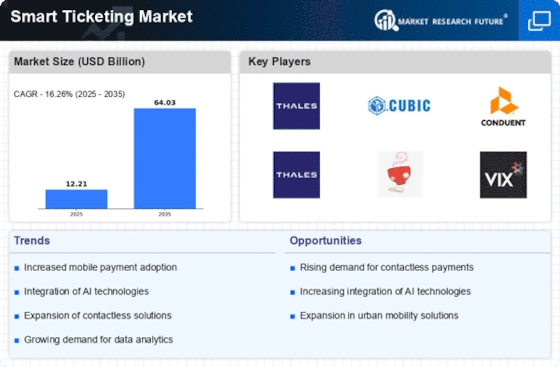Top Industry Leaders in the Smart Ticketing Market
Competitive Landscape of the Smart Ticketing Market
The smart ticketing market fueled by the digitalization of ticketing processes and rising consumer demand for convenience and personalization. This dynamic landscape is populated by a blend of established players and agile newcomers, each vying for a slice of the lucrative pie.
Key Players:
- NXP Semiconductors (US)
- Confidex Ltd. (Finland)
- Giesecke & Devrient Gmbh (Germany)
- ASK (France)
- Infineon Technologies AG (Germany)
- HID (US)
- Cubic Corporation (US)
- Gemalto NV (Netherlands)
- Xerox Corporation (US)
- Inside Secure (France)
- Smart Card IT Solutions (India)
- Paragon ID (France)
- CGI Group (Canada)
- Indra Sistemas (Spain)
- Scheidt & Bachmann (Germany)
Strategies for Success:
Competition in the smart ticketing market is fierce, prompting players to adopt diverse strategies to secure market share:
- Product Innovation: Continuous development of advanced features like real-time ticketing, multi-modal integration, and personalized offers remains crucial.
- Strategic Partnerships: Collaboration with technology providers, transportation authorities, and financial institutions accelerates market penetration and solution adoption.
- Data-Driven Insights: Leveraging user data to personalize offerings, optimize pricing strategies, and improve operational efficiency provides a competitive edge.
- Focus on Security and Privacy: Implementing robust security measures and ensuring data privacy compliance are essential for building trust and user confidence.
Factors for Market Share Analysis:
Assessing market share in the dynamic smart ticketing space requires considering various factors:
- Technology: The type of technology used (smart cards, mobile wallets, NFC chips) and its compatibility with existing infrastructure play a vital role.
- Geographical Reach: The geographic presence and market penetration of each player across different regions and industries are crucial factors.
- Product Portfolio: The diversity and features of the solutions offered, catering to specific needs and market segments, influence market share.
- Financial Performance: Revenue generated, profitability, and investment capacity impact a player's ability to compete and expand.
- Customer Satisfaction: User experience, feedback, and brand loyalty influence market share and future growth potential.
New and Emerging Companies:
The smart ticketing market constantly welcomes new entrants with innovative solutions:
- Urban Ticketing Systems: Providing cloud-based ticketing solutions tailored for smaller transit agencies and niche markets.
- Moovit: Offering integrated journey planning and mobile ticketing functionalities within its popular transit app.
- TapToGo: Specializing in open-loop contactless payments for public transportation, facilitating easy fare collection across different transit systems.
Investment Trends:
Investment in the smart ticketing market is witnessing a significant upward trend, driven by:
- Government Initiatives: Growing government support for smart city initiatives and public transportation infrastructure modernization fuels market growth.
- Rise of Contactless Payments: Increasing consumer preference for contactless payment methods creates strong demand for smart ticketing solutions.
- Focus on Sustainability: Smart ticketing offers environmental benefits through paperless ticketing and efficient fare collection, attracting investments.
Latest Company Updates:
January 17, 2024: Masabi, a leader in cloud-based mobile ticketing solutions, partnered with Keolis Downer, Australia's largest ferry operator, to implement a new mobile ticketing system across Sydney Ferries. This move will enable contactless ticketing and enhance passenger experience with features like journey planning and real-time updates.
January 16, 2024: Littlepay, a provider of open-loop mobile ticketing solutions. This investment will fuel product development, partnerships, and market penetration, aiming to establish Littlepay as a major player in the open-loop mobile ticketing space.
January 12, 2024: Cubic Corporation, a prominent provider of fare collection systems, secured a contract from Los Angeles Metro to implement a new fare collection system across its entire bus and rail network. This modern system will include contactless smart cards, mobile ticketing options, and real-time data analytics capabilities.
January 10, 2024: The European Commission proposed a new regulation aimed at establishing a common framework for interoperable ticketing in public transport across the EU. This initiative aims to streamline travel experiences by enabling passengers to use a single ticket across different transport modes and countries.
January 9, 2024: NXP Semiconductors, a major supplier of secure chip technology, launched a new secure element designed specifically for contactless ticketing applications. This new chip offers enhanced security features and processing power, catering to the evolving needs of smart ticketing systems.
January 3, 2024: SITA, a leading IT provider for the air transport industry, partnered with IATA (International Air Transport Association) to develop and implement biometric boarding solutions for airports. This collaboration aims to streamline passenger journeys by integrating facial recognition and other biometric technologies into the boarding process.










